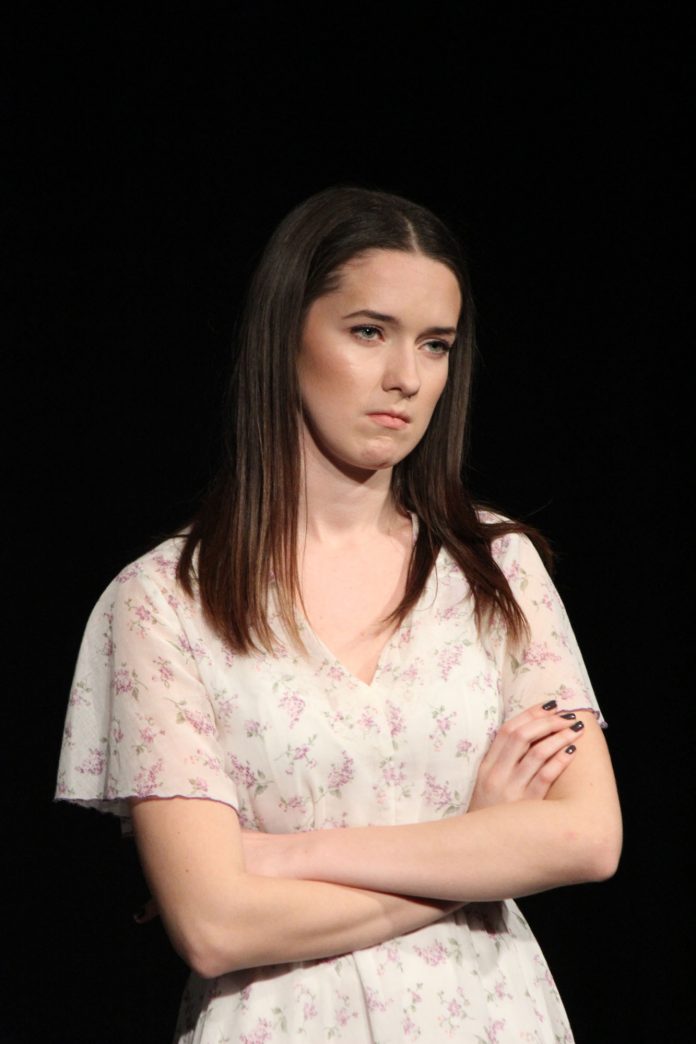This weekend I was happy to attend something that I think our school can never get enough of: student-created work. The Red Door Play Festival is put on every semester by students of all class years, where these young artists can exercise their skills in directing, acting, stage managing and, in recent years, workshopping original work.
This year’s festival was coordinated by Katherine McGuire ’20, who has spearheaded the festival for the last two semesters. And I wanted to acknowledge the pride I felt to see a wave of majority-female directors in this particular season.
Not only were many female directors highlighted, but many of the plays also focused on female stories. Particularly worth mentioning was She’s Fabulous, directed by Karla Sagastizado ‘21 and featuring Amisha Datta ‘21 and Lindsay Paige Spitzer ‘21. The piece centered on two women watching an actress, who had gotten the job over them, perform. The play begins as a discussion as to how they are going to congratulate the actress that ended up in the role but morphs into an argument as to who really deserved the part. The director’s perspective showcased the forces at work against the women in this piece, displaying how the male-dominated business forces women into competition with one another for the limited number of roles available to them. So instead of trying to address the issue that there should be a more equal playing field, women are distracted into tearing each other down personally and professionally.
What I really appreciated was the optimistic ending, in which the women end up coming to consciousness about this argument and choosing to applaud and encourage their companion. The two actresses did a wonderful and compelling job at illustrating the nuances of this conversation.
I was also struck by the work of Jennifer Coté ‘19, who will be directing on the Mainstage next semester. At the festival, she directed Terminating, or Lass Meine Schmerzen Nicht Verloren Sein or Ambivalence. This very daunting and intricate Tony Kushner play was a lot to tackle in the Red Door, but Coté did so many interesting things to make it work in the space and to draw the audience’s eye in great ways. The story illustrates a queer man speaking with his queer therapist, and navigating issues of depression and self-identity.
The hard part about this play is that Kushner’s language is extremely dense and chaotic and sometimes flies at us so fast that it is hard to truly absorb what the characters are saying — but Coté made the interesting choice of having a screen behind her actors, and various important definitions of psychological terms projected on the screen when they became relevant to the action on stage. The choice was rather defamiliarizing and made the audience truly feel the separation between hot human emotionality and cold textbook definitions, two elements constantly at odds in the psychological world. The screen also acted as the power in the space, almost a divine, all-knowing figure that the characters on stage were at the mercy of. It was really a very compelling piece of work.
In the past couple years that I have been at school, someone’s play that is chosen for the Mainstage season is usually featured in the Red Door Festival, and this semester it was The Repair Man by Sarah Jae Leiber ‘19. Leiber’s play marries ideas of Jewish cultural expression and mental health.
“I got the idea [for the play] in a few places; I was thinking about how weird it is to be ‘hangry,’ like, people get hungry and then they get really mad and blunt and honest. I was thinking about that as it relates to depression,” said Leiber. “When I get depressed, I don’t eat. Sadness just compounds when you deprive your body of that basic decency – you become a raw nerve, blunt and honest. Hangry. And what a better way of explaining this than through the Jewish fast of Yom Kippur?”
I also really enjoyed Leiber’s inspiration from the golem, a monster from Jewish folklore who’s there to protect the Jewish people. The figure of the golem shows up in Florry Arnold’s loveable portrayal of The Repair Man, who comes to do some spiritual guiding of the young protagonist.
“I also love the idea of the golem and I hate that he’s become kind of synonymous with a big, hulking, rude, idiot. I kept seeing people calling the president a golem, which I HATE, and not just because the president is an anti-Semite. The golem is a protector figure. He’s kind. He’s helpful. He’s indiscriminate. He deserves better than being compared to that guy. #NotMyGolem.”
Leiber expresses how she struggled with the line between sentimentality and blunt honesty or, in other words, comedy that is in equal parts funny and true. Anna Ricciuti ‘19 will be directing this as a Mainstage, and Leiber is confident in her abilities to flesh out both of these ideas in an effective manner.
The Red Door Play Festival was truly a spectacle to see. Featuring a combination of striking visuals, critical dialogue, complicated characters and political commentary, Red Doors bring the world to our smallest stage, reminding us that stories don’t have to be larger than life to be important.






















